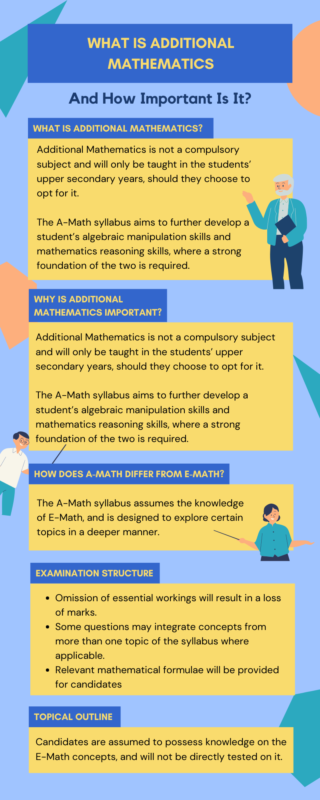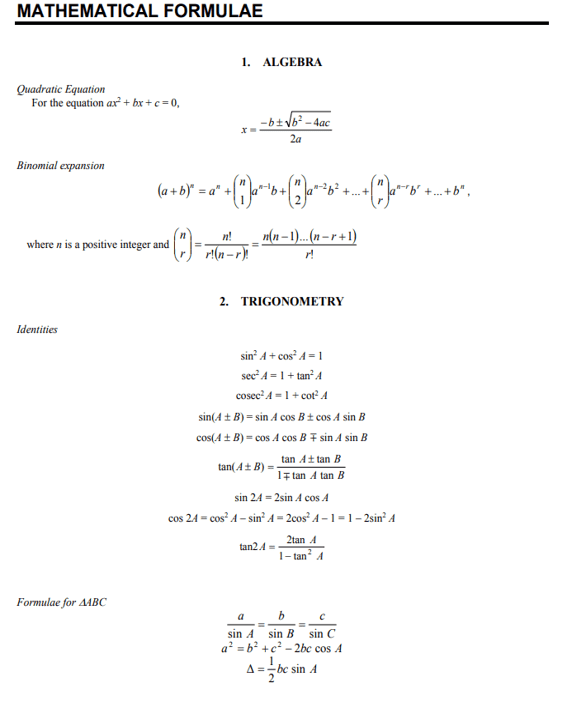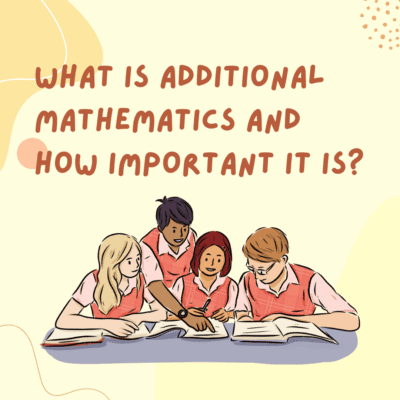What is A math?
Additional Mathematics (Syllabus 4047) or A Math is a Mathematics subject offered to upper secondary students who are taking the Singapore GCE O Level Examination. Unlike Elementary Mathematics (Syllabus 4048), where students are mandated to take up the subject throughout their secondary school education, Additional Mathematics is not a compulsory subject and will only be taught in the students’ upper secondary years, should they choose to opt for it.
The O-Level Additional Mathematics syllabus assumes the knowledge of the O-Level Elementary Mathematics and is categorised into 3 main parts – Algebra, Geometry, and Trigonometry. Designed to prepare students for the A-Level H2 Mathematics syllabus (Syllabus 9758), the A-Math syllabus aims to further develop a student’s algebraic manipulation skills and mathematics reasoning skills, where a strong foundation of the two is required.
Given that students have different interests and mastery of Mathematics, taking up A-Math provides an avenue for students to explore and hone their mathematical skills at a more advanced level. As most secondary schools will typically only offer the option to take up A-Maths to students who performed better for Maths during their lower secondary years, it is thus important to consistently do well for E-Math should a student intend to take A-Math during their O-Levels.
Why is Additional Mathematics Important?
As the O-Level A-Math syllabus is designed to be a natural progression into the A-Level H2 Maths syllabus, taking up A-Math opens doors to many science, engineering, and technology-related courses when students enter university.
Besides that, students that are equipped with knowledge of the A-Math syllabus stand to have an advantage against others when enrolling in STEM courses in Polytechnics, as they may be graded on modules that may test some A-Math concepts.
Having said all that, it is not compulsory for students to take up A-Math, and there are still a range of courses that they can pursue. In fact, even prestigious courses, like medicine and law, only require H1 Maths (commonly known as the E-Math equivalent at A-Levels) as a subject prerequisite. Nevertheless, it should be noted that most students of such courses did actually take A-Math during their secondary school years.

How Does A-Math Differ From E-Math?
For a start, E-Math is a compulsory subject for all candidates sitting for the O-Level Examinations, while A-Math is not.
The A-Math syllabus assumes the knowledge of E-Math, and is designed to explore certain topics in a deeper manner. Such topics include trigonometry, functions and polynomials, as well as the introduction of calculus, where students are required to have a stronger foundation in algebraic manipulation and conceptual understanding in Mathematics.
While it may be perceived that A-Math is a much more difficult subject as compared to E-Math, this may not be the case. Structurally, the questions asked in A-Math papers are less dynamic, and with ample practice and exposure, some students may find that A-Math is an easier subject to score well in. Learning the concepts in A-Math for the first time may be a daunting experience, but when learnt with the correct foundation, most students will grow to perform better in it.
Examination Structure
| Paper | Marks | Duration | Paper Requirements | Weightage |
| Paper 1 | 80 | 2 hours | There will be 11-13 questions of varying marks and lengths. All questions must be answered. | 44% |
| Paper 2 | 100 | 2.5 hours | There will be 11-13 questions of varying marks and lengths. All questions must be answered. | 56% |
Calculation of marks:
Paper 1 marks: $x$
Paper 2 marks: $y$
Overall marks $=\frac{x+y}{180} \times 100\%$
For example, if Alex got 47 marks for Paper 1 and 76 marks for Paper 2, his overall marks would be $\frac{47+76}{180}\times 100\%=68.3\%$
Important notes:
- Omission of essential workings will result in a loss of marks.
- Some questions may integrate concepts from more than one topic of the syllabus where applicable.
- Relevant mathematical formulae will be provided for candidates (as shown in the figure on the right)

Topical Outline
Candidates are assumed to possess knowledge on the E-Math concepts, and will not be directly tested on it.
| 1. Algebra 1.1 Quadratic Functions 1.2 Equalities and Inequalities 1.3 Surds 1.4 Polynomials and Partial Fractions 1.5 Binomial Expansions 1.6 Exponential and Logarithmic Functions |
| 2. Geometry and Trigonometry 2.1 Trigonometric Functions, Identities and Equations 2.2 Coordinate Geometry in Two Dimensions 2.3 Proofs in Plane Geometry |
| 3. Calculus 3.1 Differentiation and Integration |
Conclusion
You may often hear seniors and parents lamenting about how hard it is to do well in Additional Mathematics. However, as the saying goes, it may seem difficult at first but everything is difficult before it is easy. With consistent practice and the necessary guidance, students are able to do well and excel in Additional Mathematics. If you’re in need of help, our Additional Mathematics tuition classes are designed to help students to conquer this subject! We also have some study guides to help you excel in this subject!
If you are deliberating whether or not to take up Additional Maths, do it in the spirit of wanting to learn Mathematics at a higher level, and not because you’re giving in to peer pressure! Please bear in mind that Additional Math is not a compulsory subject, and that even if you decide not to take it up during the O-Levels, there are still many courses that you’ll be able to choose from in university.





